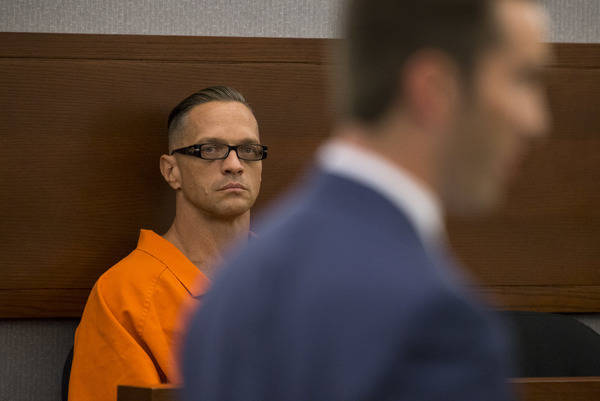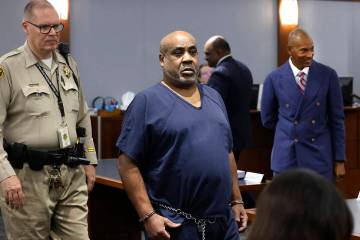Fentanyl maker joins lawsuit to block Nevada execution plan
A second pharmaceutical company wants to stop Nevada from using one of its drugs in the state’s execution of two-time murderer Scott Dozier.
A district judge on Monday approved the July 24 motion filed by Hikma Pharmaceuticals, maker of the synthetic opiate, fentanyl, to intervene in a lawsuit previously filled by Alvogen Inc., which manufactures the sedative midazolam that was to have been used in Dozier’s lethal injection.
Nevada wants to use midazolam to render Dozier unconscious, then administer a lethal dose of fentanyl to slow his breathing and follow with the muscle paralyzing agent cisatracurium to ensure that breathing stops.
On July 11, about nine hours before Dozier was set to die, District Judge Elizabeth Gonzalez barred the Department of Corrections from using midazolam after Alvogen’s lawyers argued that allowing the drug to be used in the execution would cause “serious harm” to its business.
Alvogen’s lawsuit accused the Corrections Department of surreptitiously obtaining the drug for use in the execution.
Hikma argued Monday that it also would suffer “immediate and irreparable harm” should the execution proceed, drawing protests from the state.
“It’s ironic that the maker of fentanyl, which is at the center of the nation’s opioid crisis and is responsible for illegal overdoses every day is going to … claim reputational injury from being associated with a lawful execution,” Deputy Nevada state Solicitor General Jordan T. Smith said.
Hikma’s attorney Kristen Martini told Gonzalez that the pharmaceutical company had submitted letters to the state in 2016 “specifically stating that they could not use Hikma’s products in capital punishment regimes.”
She said both drug companies share “common questions of law and fact” in their contentions that Nevada improperly obtained their drugs for the planned lethal injection of Dozier.
Attorneys for the state argued that more litigation would equal a win for the pharmaceutical companies, because at least one of the drugs planned for the execution would expire before a ruling would be made.
“Hikma’s participation in that court proceeding will not delay anything,” Martini responded. “Nothing has happened that would warrant any delay. This is the most efficient way to have everyone’s matters be heard, and not to consume judicial resources unnecessarily.”
Alvogen attorney Todd Bice did not object to Hikma joining the case.
The Nevada Supreme Court on Friday agreed to quickly consider the state’s appeal of Gonzales’ ruling, which would put the state on track for a mid-November execution.
State Attorney General Adam Laxalt’s office says it needs a high court ruling by Oct. 19, or useful prison stocks of cisatracurium will expire.
The maker of that drug, Sandoz Pharmaceuticals, is still deciding whether to join the Alvogen-Hikma case, said Colby Williams, an attorney representing the Novartis subsidiary.
A status check on the civil case before Gonzalez is set for Aug. 6.
Dozier was sentenced to die in 2007 after first-degree murder and robbery convictions in the slaying of Jeremiah Miller.
The victim’s torso was found on April 25, 2002, in a suitcase that had been dumped in a trash bin at the Copper Sands apartment complex in the 8100 block of West Flamingo Road.
Dozier also was convicted of second-degree murder in the Arizona slaying of Jasen “Griffin” Greene and was sentenced to 22 years in prison in 2005, before he was brought to Nevada to face charges in Miller’s death.
Nevada last conducted a lethal injection in April 2006.
Contact Briana Erickson at berickson@reviewjournal.com or 702-387-5244. Follow @brianarerick on Twitter. The Associated Press contributed to this report.
RELATED
Drug maker goes to Clark County court to stop Dozier execution
Clark County sends many to death row, but executions are rare
Nevada prison system appeals ruling in Dozier's execution
Lawyer says Dozier 'disappointed' execution not carried out
Parents of victim testified at Dozier's murder trial in Las Vegas
Nevada death row inmate committed 2 drug-related killings























